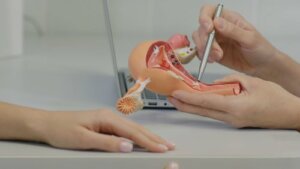What's Sex After a Hysterectomy Like?

Sex after a hysterectomy is a matter of frequent concern to couples, both physically and psychologically, given the consequences of this type of surgery.
However, intimate encounters don’t have to end as the female quality of life improves. On the contrary, women usually recover and are able to enjoy themselves even more than before. As you can see, your sex life isn’t over after a hysterectomy.
What’s a hysterectomy?

A hysterectomy is a surgical procedure in which a surgeon removes either the full uterus or just part of it. In some cases, they also remove the ovaries and/or the Fallopian tubes.
Depending on the organs affected, the physical sequelae could vary. Some of the most notable are:
- Infertility, in case of the removal of the uterus.
- Menopause (or cessation of menstruation) and vaginal dryness, if the surgeon removes the ovaries.
- Urinary incontinence (this is because the morphology of the area alters after the surgery. In this respect, pelvic floor strengthening exercises are useful, as indicated by research by Dr. Chantale Dumoulin and other authors.)
The removal of such an important part of the reproductive system can also have a psychological impact on a woman. This is because this type of forced early infertility might damage their self-esteem and lead to depression. These feelings are more pronounced during childbearing age.
Recent research, such as the longitudinal study developed by a group of scientists from the University of Queensland, Australia, provides evidence in this direction. Thus, we shouldn’t underestimate the psychological impact of surgery on women.
What’s sex after a hysterectomy like?
It’s true there are physical and psychological consequences that affect a woman’s sex life after this kind of procedure. However, don’t consider it the end of eroticism. Any woman can resume her sex life and get pleasure from it after the intervention.
Of course, both the help and understanding of her lover as well as the advice of a specialist will be essential to overcome any difficulties during her recovery.
Let’s now look at some of these situations.
1. Dyspareunia (pain during sex)

A woman can have sex after about six to eight weeks after surgery. However, some of them might experience pain.
The reasons why it occurs are often dryness and also due to the shortening of the vagina, which depends on the applied hysterectomy method.
Given this problem, you can resort to the use of lubricants as an alternative that facilitates contact. But keep in mind that sex is much more than penetration.
So, this is the time to focus on other aspects to enjoy and experience new sensations. That is, it’s an opportunity to explore other forms of pleasure until pleasurable penetration is viable.
2. Decreased sexual pleasure
Some women report decreased relationship satisfaction after a hysterectomy. But, in the absence of the uterus, this is the time to explore other ways to reach an orgasm.
For example, the direct stimulation of the clitoris will definitely lead to a woman’s climax and she’ll immensely enjoy her sexual encounters.
As you can see, it’s time to reinforce foreplay to strengthen the personal bond. This is the time to explore one another’s erogenous zones and explore other ways to enjoy sex.
You may be interested: How is Ovarian Cancer Detected?
3. A decreased sexual desire

Another consequence of hysterectomy is the decrease in libido. The good news is some pharmacological treatments can help balance any hormonal alterations and increase it.
There’s still more research to be done in order to prove the benefits of this type of therapy, but the results are positive, for the most part. At least according to a clinical trial led by the team of Shalender Bhasin from the School of Medicine at Boston University.
Some thoughts on sex after a hysterectomy
Your intimate encounters don’t have to end with the removal of your uterus or other organs; it merely enters a new stage.
What’s more, it might even lead to a more active and enjoyable sex life. Mainly because you no longer have to worry about certain diseases such as cancer, previous bleeding problems, or even pain.
This is a time to discover and experience different forms of pleasure.
Finally, keep in mind that you might need medical help and psychological counseling in order to overcome any possible discomfort and difficulties.
All cited sources were thoroughly reviewed by our team to ensure their quality, reliability, currency, and validity. The bibliography of this article was considered reliable and of academic or scientific accuracy.
- Dumoulin, C., Cacciari, L. P., & Hay-Smith, E. (2018). Pelvic floor muscle training versus no treatment, or inactive control treatments, for urinary incontinence in women. The Cochrane Database of Systematic Reviews, 10(10), CD005654. https://doi.org/10.1002/14651858.CD005654.pub4
- Froeding, L. P., Ottosen, C., Rung‐Hansen, H., Svane, D., Mosgaard, B. J., & Jensen, P. T. (2014). Sexual Functioning and Vaginal Changes after Radical Vaginal Trachelectomy in Early Stage Cervical Cancer Patients: A Longitudinal Study. The Journal of Sexual Medicine, 11(2), 595–604. https://doi.org/10.1111/jsm.12399
- Huang, G., Basaria, S., Travison, T. G., Ho, M. H., Davda, M., Mazer, N. A., Miciek, R., Knapp, P. E., Zhang, A., Collins, L., Ursino, M., Appleman, E., Dzekov, C., Stroh, H., Ouellette, M., Rundell, T., Baby, M., Bhatia, N. N., Khorram, O., Friedman, T., … Bhasin, S. (2014). Testosterone dose-response relationships in hysterectomized women with or without oophorectomy: effects on sexual function, body composition, muscle performance and physical function in a randomized trial. Menopause (New York, N.Y.), 21(6), 612–623. https://doi.org/10.1097/GME.0000000000000093; texto completo
- Lonnée-Hoffmann, R., & Pinas, I. (2014). Effects of Hysterectomy on Sexual Function. Current Sexual Health Reports, 6(4), 244–251. https://doi.org/10.1007/s11930-014-0029-3
- Wilson, L., Pandeya, N., Byles, J., & Mishra, G. (2018). Hysterectomy and incidence of depressive symptoms in midlife women: the Australian Longitudinal Study on Women’s Health. Epidemiology and Psychiatric Sciences, 27(4), 381–392. https://doi.org/10.1017/S2045796016001220; texto completo
- Ye, S., Yang, J., Cao, D., Zhu, L., Lang, J., Chuang, L. T., & Shen, K. (2014). Quality of Life and Sexual Function of Patients Following Radical Hysterectomy and Vaginal Extension. The Journal of Sexual Medicine, 11(5), 1334–1342. https://doi.org/10.1111/jsm.12498
This text is provided for informational purposes only and does not replace consultation with a professional. If in doubt, consult your specialist.








